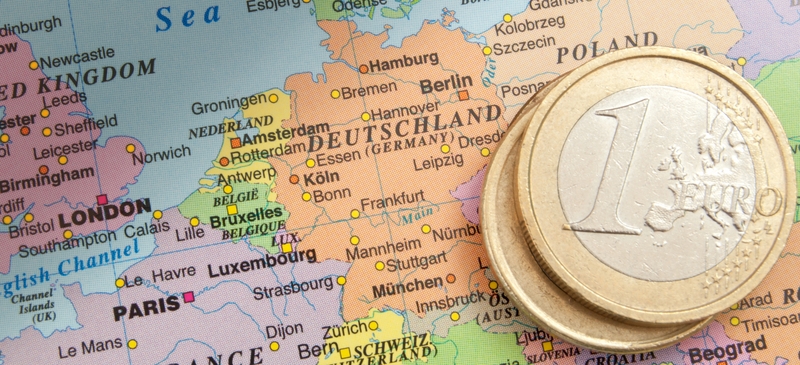
Germans, the euro and the painful truth
Will the Germans save the euro? Many people within the European Union and further afield are urging Berlin to take bold steps to secure the currency’s future. They have become frustrated by the Germans' apparent inaction.
But the view of German policy makers — conveyed to me on a recent visit to Berlin — is that the government will do what is necessary to save the euro. What it will not do, they say, is spell out in public the measures they are prepared to take, lest that encourage the eurozone’s problem countries to slacken efforts to curb budget deficits and enact reforms.
However, the best intentions of German policy makers do not guarantee the euro's survival. Whatever measures they deem necessary will have to clear the Bundestag, where many members oppose greater German generosity to Southern Europe, and then the constitutional court, which tends to cavil at more powers for the European Union.
The court of public opinion also counts, but German leaders have seldom explained to voters how the euro underpins their prosperity. And in the event of a financial panic, perhaps prompted by a Greek exit from the euro, could Germany’s politicians respond quickly enough?
According to one senior German official, the key people in the Chancellery and Finance Ministry have little understanding of financial markets. Berlin is around 450 kilometers from Germany’s financial centre, Frankfurt, whereas in London and Paris politicians, officials and financiers live in close proximity. This may lead the German government, the official warns, to underestimate the speed with which markets can move, and their destructive potential.
German officials know that a healthy euro requires deeper eurozone integration. They recognise the need for some sort of 'banking union.' They accept that they will have to talk about “euro bonds” — pooled borrowing for the eurozone — but say that a fiscal union enforcing budgetary discipline must come first. They want an 'economic union' that would push the eurozone’s weaker members to become more competitive. That would mean giving the European Commission the means to cajole governments to alter policies in areas such as pensions, labour markets, privatisation and company taxation.
Such changes would affect only eurozone countries, but require all 27 EU member-states to agree to amend the Union treaties. German officials worry that Britain might block a new treaty, as it did last December, forcing the other countries to set up parallel structures alongside the EU Such a result, they believe, would weaken both the single market and Britain’s sway within the Union. Given that Britain’s contribution to resolving the crisis has been sermons rather than money, the Germans do not think they owe London any favours.
When 'Anglo-Saxon' commentators criticise Germany for imposing excessive austerity, the response can veer toward paranoia. One key individual, when told that many G-20 countries agreed with the criticism, said that that was because Anglo-Saxons dominated the global media. One hears similar words in Beijing and Moscow.
Britain may be a bother, but the country that causes the biggest worries is France. François Hollande has turned out to be harder to handle than expected, for example by repeatedly calling for euro bonds. German officials fret that the French Socialists do not understand their country’s economic weakness, and that they are not serious about either structural economic reform or cutting the budget deficit. “If the markets see that France and Germany disagree on the euro, they will have more doubts about the currency, so the French should stop their propaganda wars against Germany,” one official said.
The Germans are particularly annoyed that France has teamed up with Italy and others advocating a softening of austerity. Several months ago the Germans were fans of Mario Monti, Italy’s economist prime minister. But his public criticisms of German policy on the euro, combined with his lackluster labour-market reforms, have upset his erstwhile friends in Berlin.
The divergence on how to handle the euro crisis between Germany (and allies such as Finland and the Netherlands), and a group led by France and Italy suggests an obvious compromise. France and the southern Europeans should accept structural reform, budgetary discipline and a loss of sovereignty over some aspects of economic policy making. Germany should give member states more time to reach budget targets, let the southern Europeans write off more debt, and accept some debt mutualisation.
Might Germany embrace such a grand bargain? Perhaps, one official said. “Some people around Hollande see what France must do, but it might be politically difficult for the French to accept fiscal union.” This bargain would be politically difficult for Germany, too.
Even some admirers of Chancellor Angela Merkel admit that she lacks vision, dislikes grand ideas, is extremely cautious and has little emotional connection to the EU. She resents being told what to do by foreigners and thinks their advice may be self-serving. But she is also a consummate political tactician who does not want to be the chancellor who allowed the euro to collapse.
Hans Eichel, a former finance minister of the opposition Social Democratic Party, said the SPD would support Merkel in doing what it takes to save the euro. “The Germans are sceptical about the euro but don’t want to return to the Deutsche mark, so if Merkel is brave enough to take Germany toward more Europe, the SPD, business and the trade unions will follow — but she must lead.”
Many Germans hope that the eurozone’s ailments can be cured without their having to pay very much. But some top officials in Berlin understand that Germany will have to pay a heavy price. If Merkel and other political leaders can explain this painful truth to the people, the euro’s prospects will improve.
